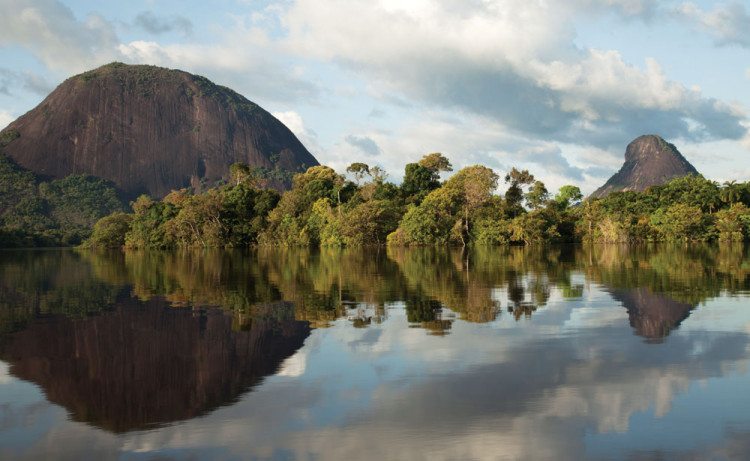By Richard Emblin – October 26, 2024
As Colombia hosts the 16th UN Biodiversity Conference – COP16 – indigenous leaders, scientists, and AI experts will meet from October 28 to November 1 for the First International Summit on Ancestral Knowledge and Artificial Intelligence. Set against the backdrop of Universidad del Valle in Cali, this gathering of leading academics and researchers seeks to bridge two worlds: technology and Indigenous traditions.
Sponsored by the Barcelona-based NGO, PlanetAI Nature Space, the summit offers an unprecedented opportunity to explore how large-scale conservation projects can benefit from data harvesting and top-tier technology to verify carbon capture. One such project, led by GreenLife Conservation, spans more than 3.7 million hectares of pristine tropical rainforest in Colombia’s Guainía department. Known as the ‘Flor de Inírida’ conservation project, PlanetAI Nature Space is deploying state-of-the-art technology, including mapping mega-drones, to survey biodiversity in this fragile biosphere.
By drawing on both the promise of artificial intelligence (AI) and the guidance of ancient practices from the Indigenous peoples who inhabit Guainía, GreenLife Conservation and PlanetAI Nature Space aim to empower remote communities to harness AI tools to protect their lands and endangered ecosystems. “Indigenous leaders, guardians of millennia-old wisdom, are essential not only to conserving culture but also to teaching us sustainability,” highlights María Fernanda González, President of PlanetAI Nature Space. “Harmonizing life with nature has never been more urgent,” she stated from the Green Zone at COP16.
With Indigenous leaders and scientists joining from around the globe, González captures the summit’s vision—reimagining the future of conservation by combining traditional knowledge with cutting-edge technology.
Indigenous communities worldwide, representing nearly 6% of the global population, protect around 80% of Earth’s remaining biodiversity, according to the United Nations. In Colombia alone, 115 Indigenous groups live across more than 800 territories, practicing traditions that sustainably manage ecosystems, protect sacred sites, and steward diverse habitats. Integrating these longstanding practices with advanced AI could accelerate global conservation efforts.
A core theme of the summit, “Earth Observation and Artificial Intelligence for Conservation,” will focus on how AI can enhance environmental monitoring, biodiversity tracking, and ecosystem preservation. By analyzing satellite imagery and detecting changes across vast landscapes, AI can quickly identify deforestation, water contamination, and other ecosystem threats that traditional methods may overlook or detect too late. González and her team envision AI becoming an ally to Indigenous communities, aiding them in responding to such challenges while preserving their ecosystems.
Another critical theme, “Empowerment of Indigenous Communities,” will spotlight initiatives designed to increase Indigenous access to technology and emphasize the role of Indigenous women and youth in championing sustainable futures. Presenters will discuss how AI and Earth observation data can inform resource management, enabling communities to map territories, monitor wildlife, and assess land health through data-driven insights. This dialogue between modern and ancestral approaches promises to empower communities in ways that respect and align with cultural values.
Bridging Science and Sacred Traditions
Workshops and panel discussions will also explore collaborative conservation projects, sharing strategies for resource management and blue carbon conservation. Indigenous leaders, many of whom hold traditional ecological knowledge passed down over centuries, will work with scientists to develop practices that protect and restore sacred sites. This concept of “blue carbon” conservation—protecting coastal ecosystems to sequester carbon—gains new relevance as both Indigenous knowledge and AI reveal the critical role these ecosystems play in mitigating climate change.
In one workshop, Indigenous representatives will collaborate with AI experts to interpret satellite imagery, analyzing coastal changes and ocean patterns. This exchange enables Indigenous leaders to validate AI findings against their ecological observations and cultural practices. This collaboration has the potential to redefine conservation priorities, respecting Indigenous insights into the natural world while optimizing new tools to strengthen these efforts.
The summit will conclude with a graduation ceremony for the first cohort of students completing the course Ancestral Knowledge and Natural Intelligence for Creating AI with Satellite Imagery, Focused on Planet Conservation. This innovative program trains participants in the use of AI and satellite imagery for sustainable territory management, a skill set that bridges cultural heritage and modern science.
“AI offers tools, but it’s Indigenous knowledge that has been time-tested to sustain life on Earth,” remarked González. “This summit is key to bringing together the academic community and national government to understand that technology is essential to conservation. We must move beyond words to actions,” she said.
Reflecting on COP16’s goal to foster partnerships that serve both planet and people, the synergy between AI’s data power and Indigenous practices of the rainforest holds promise for conserving trees, wetlands, and diverse ecosystems critical to the carbon capture process. Respect for Indigenous communities is also essential to maintaining ecosystem health.
As COP16 draws to a close, González hopes it will mark the start of a new chapter in global conservation—one where ancient knowledge and modern technology walk hand in hand. For the Colombian researcher and summit participants, protecting biodiversity is not only about saving species but about ensuring that the world’s ancestral wisdom remains integral to a shared future.
Event Details
First International Summit on Ancestral Knowledge and Artificial Intelligence
- Dates: October 28 – November 1, 2024
- Location: Universidad del Valle – Ives Chatain Auditorium, Faculty of Health, San Fernando Campus, Santiago de Cali, Valle del Cauca, Colombia
- Format: In-person and virtual attendance options
- Official Website and Registration: PlanetAI Nature Space
